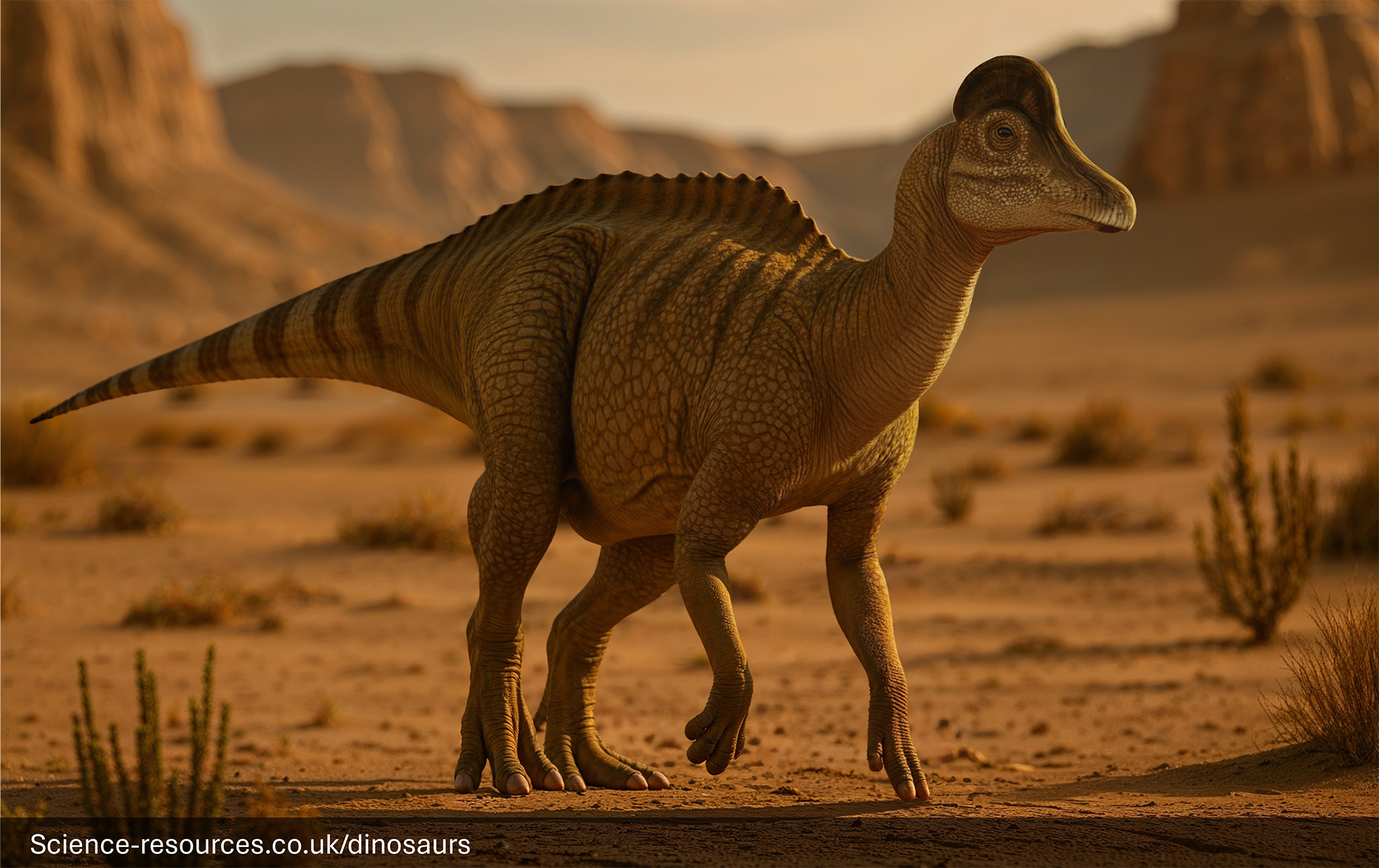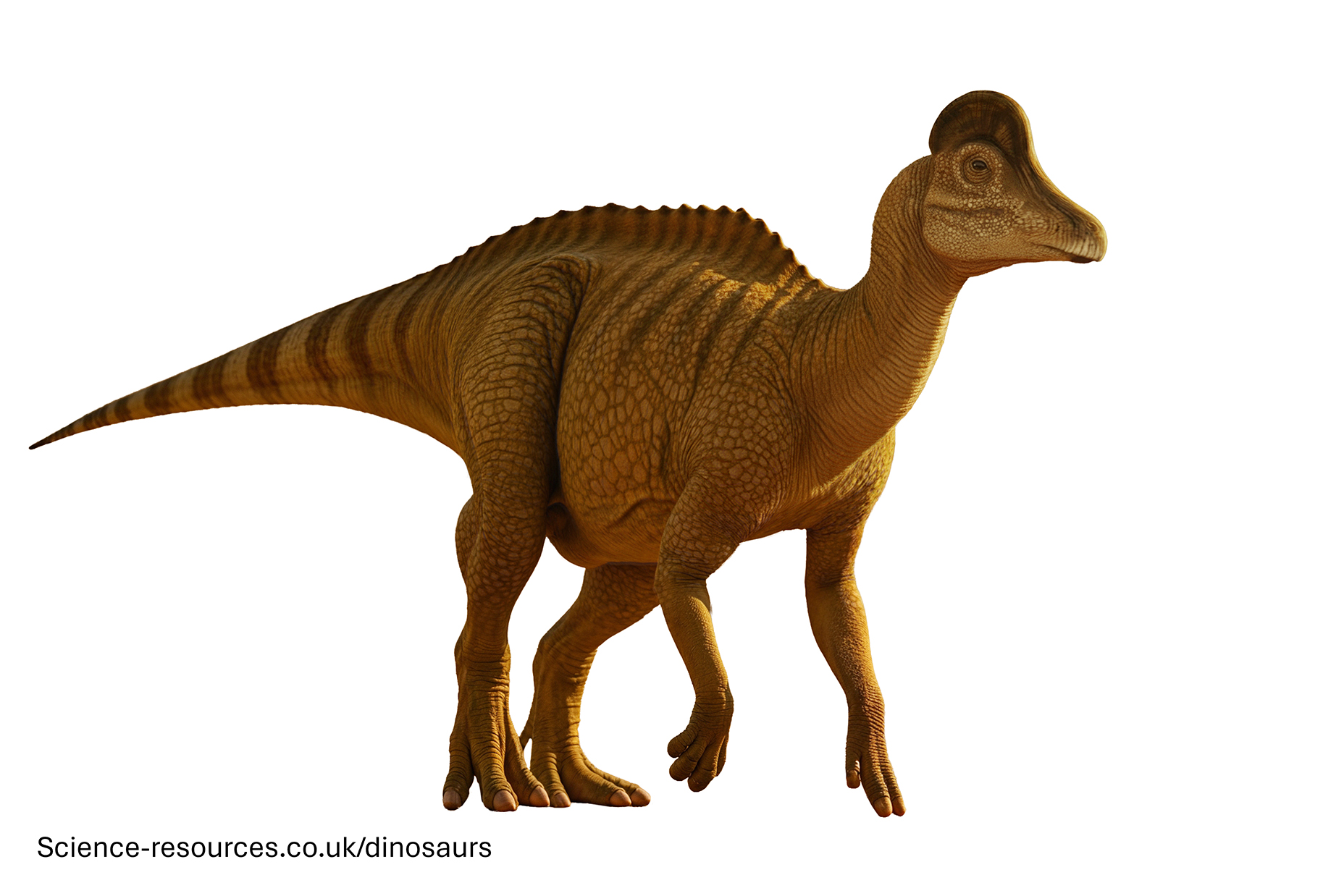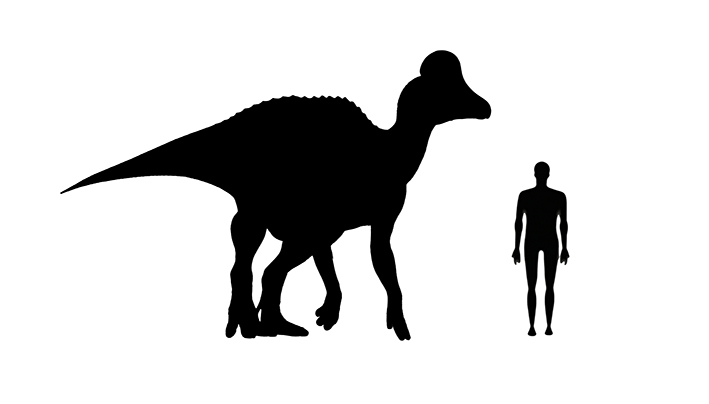Dinosaurs A:Z | C
You may also be intrested in: Free Dinosaur games
Dinosaurs: Corythosaurus (Helmet Lizard)
You may also be intrested in: Free Dinosaur games
Corythosaurus was a fascinating dinosaur that lived during the Late Cretaceous Period, about 77–75 million years ago in what is now North America (mainly Canada and the United States). It is best known for the tall, helmet-shaped crest on its head, which looked a bit like the helmet worn by ancient Greek soldiers! Scientists believe Corythosaurus used its crest to make sounds, communicate, and possibly even recognise others of its kind. Corythosaurus was a large, duck-billed dinosaur. It could reach up to 9 metres (30 feet) in length and stood about 2 metres (6.5 feet) tall at the hips. Weighing around 3–4 tonnes (about as much as a large car), it was a gentle giant of its time! Corythosaurus had a long, flat tail, strong hind legs, and walked on both two and four legs. Its most famous feature was its large, hollow crest, which rose from its head and curved slightly backwards. Some scientists think the crest could have helped it make loud, bellowing sounds. Its body was covered in scaly skin, and some fossils even show the patterns of its scales! Corythosaurus Generative AI Notification: Some elements of this image have been created or enhanced using AI technology. To find out how we create all our dinosaurs, click here. Corythosaurus was a plant-eater (herbivore). It had hundreds of closely packed teeth that worked like a giant food processor, perfect for chewing tough, fibrous plants. Its flat, duck-like beak helped it crop leaves, branches, and water plants as it walked along rivers and forests. Fossils of Corythosaurus have been found in what is now Alberta, Canada, and parts of the United States. During the Cretaceous Period, these areas were covered by lush forests, swamps, and river deltas, perfect for a plant-eater like Corythosaurus.
What is a Corythosaurus?
How big was Corythosaurus?
Appearance

What did Corythosaurus eat?
Where did Corythosaurus live?
Interesting facts
Pronounced: ko-RITH-oh-sore-us Name Means: "Helmet Lizard" Length: up to 9 m (30 feet) Height: up to 2 m (6.5 feet) at the hips Weight: about 3,000–4,000 kilograms (3–4 tonnes) Diet: Herbivore (plants) Time: Late Cretaceous (about 77–75 million years ago) Fossils Found: North America (Canada, USA)


Corythosaurus Facts
Corythosaurus was part of the Hadrosauridae family, a group of plant-eating dinosaurs known as "duck-billed dinosaurs" because of their flat, beak-like mouths. Hadrosaurs were some of the most common dinosaurs in Late Cretaceous North America. It is related to other hadrosaurs like Saurolophus, Edmontosaurus, and Parasaurolophus. Corythosaurus could walk on two or four legs, and when it needed to move quickly, it probably ran on its strong hind legs. Scientists think it could run as fast as a modern-day ostrich, helping it escape from predators. Corythosaurus had a large, bony crest on its head that looked just like a helmet. The crest was hollow and connected to its nose and breathing passages. Scientists think it used the crest to make sounds, breathe, or even for display to impress others. Yes, Corythosaurus likely lived in large groups, or herds. Living in herds helped protect them from predators and may have helped them find food and care for their young. During the Late Cretaceous Period, Corythosaurus shared its world with many other dinosaurs, such as:
Which family of Dinosaurs did Corythosaurus belong to?
How did Corythosaurus move?
What did Corythosaurus use its crest for?
Did Corythosaurus live in herds?
What other dinosaurs lived at the same time as Corythosaurus?
Corythosaurus FAQ
Q1: What is a Corythosaurus?
A1: Corythosaurus was a large, herbivorous dinosaur that lived during the Late Cretaceous Period, around 76-73 million years ago.
Q2: What does Corythosaurus mean?
A2: Its name means "helmet lizard" because of the tall, helmet-shaped crest on its head.
Q3 Was Corythosaurus a carnivore?
A3: No, it was a plant-eater (herbivore).
Q4: How big was Corythosaurs crest?
A4: The crest could be up to 0.5 metres (1.5 feet) long!
Q5: Did Corythosaurus have feathers?
A5: No, it had scaly skin.
Q6: Where did Corthosaurus live?
A6: In what is now Canada and the United States, North America.
Q7: Did Corythosaurus live in herds?
A7: Yes, it likely lived in large groups.
Q8: What did Corythosaurus use its crest for?
A8: The crest helped it make sounds, communicate, and possibly recognise friends and family!
You may also be intrested in:
- How we create our dinosaurs
- How big were dinosaurs
- Dinosaurs: A-Z
Tags: How big was Corythosaurus, Corythosaurus size, where does Corythosaurus live, how tall are Corythosauruss, what does Corythosaurus mean, Corythosaurus, Corythosaurus facts